Dragon Ball Z: Level 1.2 Blu-ray Movie
HomeDragon Ball Z: Level 1.2 Blu-ray Movie 
FUNimation Entertainment | 1990 | 410 min | Rated TV-PG | Dec 13, 2011
Movie rating
8.4 | / 10 |
Blu-ray rating
| Users | 4.0 | |
| Reviewer | 3.5 | |
| Overall | 3.9 |
Overview
Dragon Ball Z: Level 1.2 (1990)
Raditz, Gokus brother has traveled to Earth to find out why Goku has not yet destroyed the planet as he was supposed to do. But while as a baby, Goku was dropped (down a huge cliff) and forgot his real mission. Kakarot, Gokus real name battles his brother Raditzs along with former enemy Piccolo and friend Krillin. Meanwhile, Gohan; Gokus son reveals his hidden powers against Raditz and nearly kills Raditz. However Goku is killed in the end, but Raditz is eventually defeated by Piccolo. Before he dies, he tells them that two evil-saiyans even more powerful then he is, are on route to Earth. The remaining fighters, Krillin, Yamcha, Tien, and Chatsu begin their training to battle the evil saiyans, while Piccolo takes off with Gohan to train him in using his new found power.
Starring: Daisuke Gōri, Mayumi Tanaka, Kenji Utsumi, Masako Nozawa, Toshio FurukawaNarrator: JŰji Yanami, Kyle Hebert, Doc Harris
Director: Daisuke Nishio, Yoshihiro Ueda, Mitsuo Hashimoto, Minoru Okazaki, Kazuhisa Takenouchi
| Anime | Uncertain |
| Foreign | Uncertain |
| Action | Uncertain |
| Fantasy | Uncertain |
| Comic book | Uncertain |
| Sci-Fi | Uncertain |
| Adventure | Uncertain |
| Martial arts | Uncertain |
| Comedy | Uncertain |
Specifications
Video
Video codec: MPEG-4 AVC
Video resolution: 1080p
Aspect ratio: 1.33:1
Original aspect ratio: 1.33:1
Audio
English: Dolby TrueHD 5.1
English: Dolby TrueHD 2.0
Japanese: Dolby TrueHD Mono
Subtitles
English
Discs
50GB Blu-ray Disc
Two-disc set (2 BDs)
Packaging
Slipcover in original pressing
Playback
Region A, B (locked)
Review
Rating summary
| Movie | 3.5 | |
| Video | 4.5 | |
| Audio | 4.5 | |
| Extras | 0.5 | |
| Overall | 3.5 |
Dragon Ball Z: Level 1.2 Blu-ray Movie Review
The battle royale begins. Kind of.
Reviewed by Jeffrey Kauffman December 12, 2011With all the wild and wacky characters that traipse in and out of Dragon Ball Z, one has to wonder if lurking there in the background somewhere is the legendary Saiyan Cash Cow. This series has become such a consistent source of revenue over the years, not only with its many broadcast versions, but also with an astounding number of reissues on various home media formats (and in a number of different versions to boot) that itís been a rare month over the past several years that hasnít had some kind of Dragon Ball Z release. Of course if there werenít the rabid fan base for these products, there would be no way to effectively market them, and if thereís one thing that should be obvious to even casual observers of the anime scene, itís that the fan base of Dragon Ball Z is very rabid, as in foaming at the mouth, snarling and just this side of crazed rabid. (I count my own oldest son in that group, so please donít be offended if youíre one of these rabid fans). Dragon Ball Z in its original form seems like an especially odd series to have generated so much loyalty. While itís fun and enjoyable, and even weirdly goofy a lot of the time (one of its best elements, actually), in its original, uncut version it can also been incredibly slow and laborious, which is probably what led to the Dragon Ball Z Kai reboot, one which sought to chop out all the ďdull bitsĒ and get straight to the act. Dragon Ball Z Kai had its own incredibly long and protracted set of Blu-ray releases (which are in fact being re-released in larger boxed sets), and now FUNimation has gone back to the well for a high definition release of the original broadcast version of Dragon Ball Z. Considering the fact the original series ran for literally hundreds of episodes and each two disc set released thus far has seventeen episodes a piece, itís going to be quite some time before we see a complete set of Dragon Ball Z, by which time no doubt there will be some other release in some form waiting in the wings. But for the cynics out there (and you know who you are), one canít fault FUNimation too much for this strategy, for theyíve obviously lavished a lot of care and perhaps more importantly money on this new release, going back to the original film elements and restoring the entire series frame by frame.
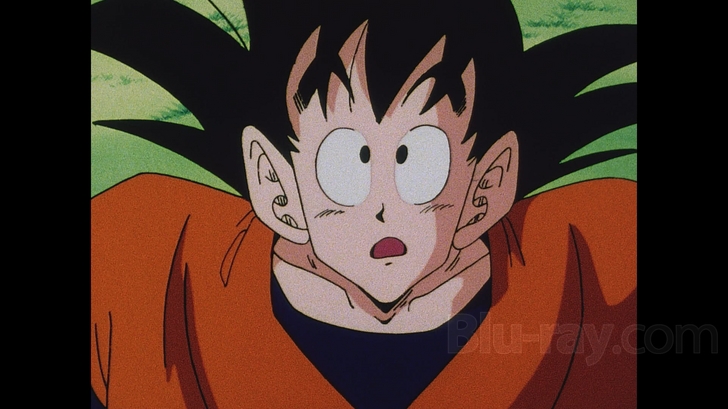
These seventeen episode compilations make for a kind of weird, often truncated, viewing experience when taken by themselves, one that so far has picked up story thread mid-plot arc and which in this instance end maddeningly right before a major battle finally comes to a conclusion. This seventeen episode choice is also somewhat peculiar in that the first season ends with Episode 39, meaning that Level 1.3 will have the last few episodes of the first season and the first couple of handfuls from Season 2. If FUNimation follows suit and does what it did with Dragon Ball Z Kai, there ultimately (several years down the line at this rate) will be season boxed sets, which from a collectorís standpoint might make the most sense.
This first season of Dragon Ball Z is subtitled the Saiyan Saga, but itís several episodes into even this second volume from the season until Vegeta and Nappa make their entrance, after which Vegeta especially becomes the central villain of the piece. Up until Vegeta and Nappa enter the story, we get a sort of parallel portrait of both Gohan and Goku undergoing separate training regimens. The initial showdown between Gohan and Vegeta takes up several episodes as Goku attempts to make his way back to Earth.
Much like daytime soap operas, things can take forever (or at least seem to take forever) on this ďwarts and allĒ version of Dragon Ball Z. While those raised on Kai may not be too thrilled by the often slower than molasses pace of this original version, those who remember this version best will probably always argue that itís the best, as truth be told several subplots are given short shrift in Kai. That said, viewers must be prepared for major elements (like Gokuís return to Earth) to be spread out over several episodes, and even relatively minor elements like Gohan and his team trying to develop a strategy to defeat Vegeta can take most of one episode.
In fact one of the most maddening things about this set is just when things finally kick into high gear, and we're presented with a knock down, drag out fight, the set ends before the climax is reached. That may be really smart marketing, a la cliffhangers of yore, but if it keeps happening through what are evidently going to be scores and scores of these seventeen episode releases, FUNimation may find that the Saiyan Cash Cow has an enemy even it can't defeat: The Angry Consumer.
Dragon Ball Z: Level 1.2 Blu-ray Movie, Video Quality 
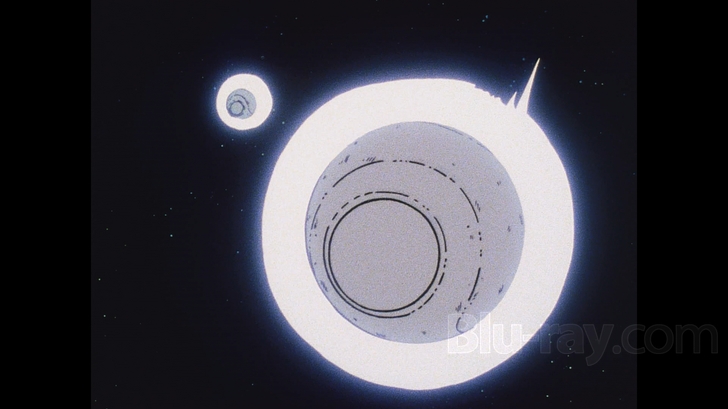
My comments regarding the video quality of Dragon Ball Z Level 1.1 are repeated here with some changes, as the
overview I gave in the first volume continues for this second outing (and I imagine will continue to for the duration of the
series' subsequent volumes.
How you feel about grain is going to probably determine a lot about how you respond to this frame by frame restoration,
presented via an AVC
encode in 1080p and 1.33:1. The entire series has been remastered in HD from the original 16mm film elements, and
according to FUNimation, this has been done on a frame by frame basis. DNR phobes need not be
worried in the slightest,
because in fact some curmudgeons (yes, you know who you are) are probably going to swing to the opposite end of the
spectrum and complain
that this presentation is too grainy. I personally found it to be very filmic in appearance, more akin to the
Fleischer
classics of the 1930s
and 1940s in a way, and for me, that is definitely not a bad thing. The best thing about this new restoration is the
virtual
lack of blemishes and
damage (I did manage to catch a couple of niggling little items, but they're very minor). Also extremely impressive is the
color correction, which
literally casts a whole new light on several key characters. Line detail is extremely strong and distinct and colors are
bold
and very well
saturated. If the overall series still sports a somewhat soft look, that's no doubt inherent in the original source elements
as
well as the
animation style utilized (especially with regard to the painterly backgrounds).
This set has a tendency to get into some more abstract, graphical design elements than the opening set of seventeen episodes did, and
those look fantastic, including (as strange as it may sound) the ones rendered in black and white. Contrast is especially strong in this brief
moments and help the series to really pop visually.
Dragon Ball Z: Level 1.2 Blu-ray Movie, Audio Quality 
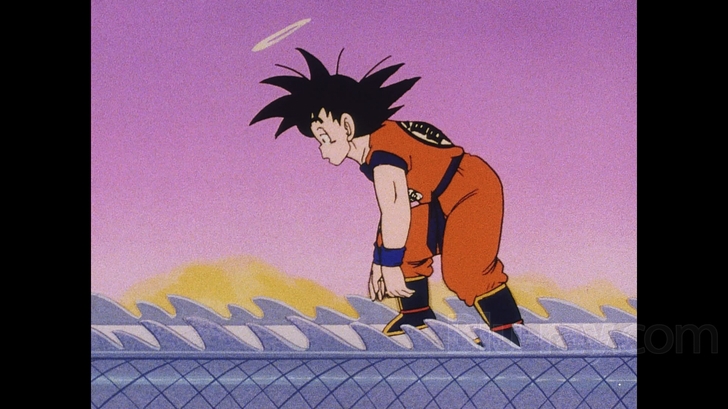
As with the first volume of this release, FUNimation has provided three lossless offerings on this Blu-ray, the English dub in Dolby TrueHD 5.1 with the original Japanese music, the original English language broadcast version (with broadcast version music) in Dolby TrueHD 2.0 and the original Japanese track (with Japanese music) in Dolby TrueHD mono. For the bulk of my watching, I opted for the 5.1 mix, as the synth heavy, proto-pop "stylings" of the broadcast version's music weren't as much to my personal liking as the 5.1's original Japanese music. Add to that some very smart and fun surround repurposing, without attendant fussiness or gimmickry, and the 5.1 track is the clear winner here, at least for those who want a fairly consistently immersive experience. Fidelity is top notch on this track, and the battle scenes are filled with slams, punches and crazy sound effects that ping pong around the surrounds with abandon. There's some great LFE in many (if not most) episodes, and the music is very well represented as well. Dynamic range is exceptional on this track, though truth be told, Dragon Ball Z tends to work at a fairly consistent hyperbolic level most of the time. The Japanese language track sounds noticeably muffled compared to the two English tracks, most likely due to age and the original recording environment and techniques.
Dragon Ball Z: Level 1.2 Blu-ray Movie, Special Features and Extras 
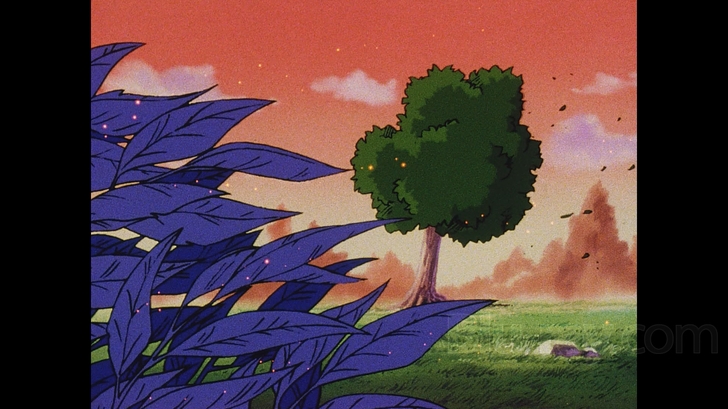
- Textless Opening Song (HD; 1:52)
- Textless Closing Song (HD; 1:39)
- An Engineer and a Pen: Autograph Collection Part 1 (HD; 2:10) is a kind of silly supplement with autographed photos of the English voice cast.
- The Many Faces of Christopher R. Sabat (HD; 1:00) is another completely goofy supplement with a photo of Sabat getting made over with several silly additions. Hopefully the many (many) subsequent "levels" (meaning volumes) of this new Dragon Ball Z set of releases will offer more substantive supplements.
Dragon Ball Z: Level 1.2 Blu-ray Movie, Overall Score and Recommendation 
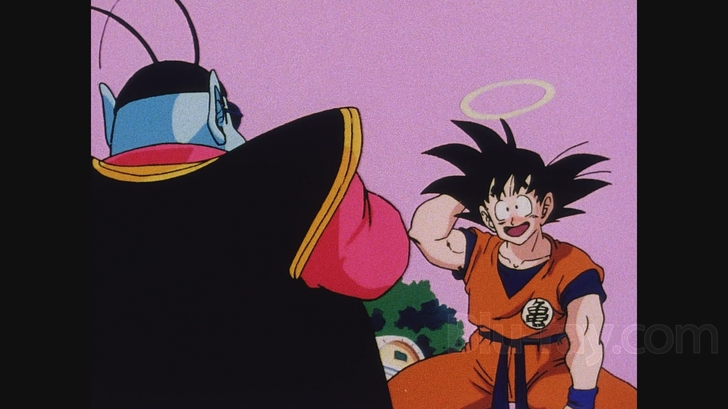
The good news for Dragon Ball Z fans is they have choices, in fact lots of them. This franchise has been released and re-released and re-re-released so many times in various formats and media that it's actually kind of hard to keep track of them all. While there's no denying the care and effort that FUNimation has put into restoring the series, it similarly can't be denied (at least by those without a lifelong love of the series which may perhaps blind them to a more objective analysis) that the original version of Dragon Ball Z can be awfully slow going a lot of the time, with quite a bit of fairly useless filler and padding. Still and all, the series is almost always effortlessly entertaining, and its frequently goofy humor helps to quell the more serious complaints. Recommended.
Other editions
Dragon Ball Z: Other Seasons

Dragon Ball Z: Level 1.1
1989-1990

Dragon Ball Z: Season 1
1989-1990

Dragon Ball Z: Season 1
1989-1990

Dragon Ball Z: Season 1
1989-1990

Dragon Ball Z: Season 2
1990-1991

Dragon Ball Z: Season 2
1990-1991

Dragon Ball Z: Season 2
1990-1991

Dragon Ball Z: Level 2.2
1990

Dragon Ball Z: Level 2.1
1990

Dragon Ball Z: Season 3
1991

Dragon Ball Z: Season 4
1991-1992

Dragon Ball Z: Season 3
1991

Dragon Ball Z: Season 4
1991-1992

Dragon Ball Z: Season 3
1991

Dragon Ball Z: Season 4
1991-1992

Dragon Ball Z: Season 5
1992

Dragon Ball Z: Season 6
1992-1993

Dragon Ball Z: Season 5
1992

Dragon Ball Z: Season 6
1992-1993

Dragon Ball Z: Season 5
1992

Dragon Ball Z: Season 6
1992-1993

Dragon Ball Z: Season 7
1993-1994

Dragon Ball Z: Season 7
1993-1994

Dragon Ball Z: Season 7
1993-1994

Dragon Ball Z: Season 8
1994-1995

Dragon Ball Z: Season 8
1994-1995

Dragon Ball Z: Season 8
1994-1995

Dragon Ball Z: Season 9
1995-1996

Dragon Ball Z: Season 9
1995-1996

Dragon Ball Z: Season 9
1995-1996
Similar titles
Similar titles you might also like

Dragon Ball GT
1996-1997

Dragon Ball Z: Resurrection 'F'
2015

Dragon Ball Z: Battle of Gods
Extended Edition
2013

Dragon Ball
1986-1989

Dragon Ball Z Kai: Season 1
2009

Dragon Ball Z: Bardock - The Father of Goku
1990

Dragon Ball Z The Movie 3: The Tree of Might
1990

Dragon Ball Z The Movie 8: Broly - The Legendary Super Saiyan
1993

Dragon Ball Super: Complete Series
Limited Edition
2015-2018

Dragon Ball Z The Movie 9: Bojack Unbound
1993

Dragon Ball Z The Movie 13: Wrath of the Dragon
1995

Dragon Ball Z The Movie 5: Cooler's Revenge
1991

Dragon Ball Z The Movie 1: Dead Zone
1989

Dragon Ball Z: The History of Trunks
1993

Dragon Ball Z The Movie 10: Broly - Second Coming
1994

Dragon Ball Z The Movie 7: Super Android 13
1992

Dragon Ball Z The Movie 2: The World's Strongest
1990

Naruto: The Complete Series
Limited Edition
2002-2007

Dragon Ball Z The Movie 4: Lord Slug
1991

Fairy Tail: Collection 1
2009-2010